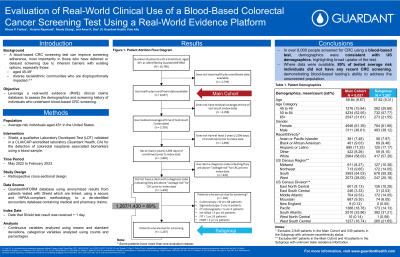Sunday Poster Session
Category: Colon
P0171 - Evaluation of Real-world Clinical Use of a Blood-based Colorectal Cancer Screening Test Using a Real-World Evidence Platform
Sunday, October 22, 2023
3:30 PM - 7:00 PM PT
Location: Exhibit Hall

Has Audio
- SF
Shaun P. Forbes, PhD
Guardant Health
Portland, OR
Presenting Author(s)
Shaun P. Forbes, PhD, Victoria Raymond, MS, Nicole Zhang, MPH, Amar K. Das, MD, PhD
Guardant Health, Palo Alto, CA
Introduction: A blood-based CRC screening test can improve screening adherence, most importantly in those who have deferred or delayed screening due to inherent barriers with existing options, especially those aged 45-49 and those from diverse racial/ethnic communities who are disproportionally impacted. Leveraging a real-world evidence (RWE) clinical claims database, we report the demographics and screening history of individuals who underwent blood-based CRC screening.
Methods: Shield is a qualitative Laboratory Developed Test (LDT) validated in a CLIA/CAP-accredited laboratory (Guardant Health, CA) for the detection of colorectal neoplasia associated biomarkers, intended for average risk screening in individuals age 45+. Anonymized results from consecutively tested patients (May 2022 to February 2023) were linked, using a secure and HIPAA-compliant methodology, to a de-identified encounters database containing medical and pharmacy claims to provide a view of patients’ demographics and clinical journeys, including prior screening history and real-world clinical outcomes.
Results: A cohort of 8,057 tested individuals was identified in the RWE platform as having verifiable insurance coverage at any time. Median age: 60 years (16%, 45 – 49; 53%, 50 – 64; 32%, 65+). 61% were female. Race/ethnicity were recorded for 63% of the cohort, 17% were of Hispanic/Latino ancestry. Of those with non-Hispanic/Latino ancestry, 9% were Asian or Pacific Islander, 11% Black or African-American, 70% White, 10% multiple or other race. 18% of the cohort had active medical insurance coverage for 3+ years prior to test date and did not have any claims suggesting above average CRC risk. 89% of this subcohort did not have any claims for CRC screening (direct visualization, imaging, or stool-based) for 3+ years prior to the test date, confirming no recent screening. In this subcohort, race and ethnicity was recorded as 17% Hispanic/Latino, and non-Hispanic: Asian, 8%, Black/African-American 9%, White, 57%, and multiple or other race, 8%. Data are maturing to evaluate clinical follow-up after blood-based test results.
Discussion: In over 8,000 people screened for CRC using a blood-based test, demographics were consistent with US demographics, highlighting broad uptake of the test. Where data were available, 89% of tested average risk individuals did not have any recent CRC screening, demonstrating blood-based testing’s ability to address the unscreened population.
Disclosures:
Shaun P. Forbes, PhD, Victoria Raymond, MS, Nicole Zhang, MPH, Amar K. Das, MD, PhD. P0171 - Evaluation of Real-world Clinical Use of a Blood-based Colorectal Cancer Screening Test Using a Real-World Evidence Platform, ACG 2023 Annual Scientific Meeting Abstracts. Vancouver, BC, Canada: American College of Gastroenterology.
Guardant Health, Palo Alto, CA
Introduction: A blood-based CRC screening test can improve screening adherence, most importantly in those who have deferred or delayed screening due to inherent barriers with existing options, especially those aged 45-49 and those from diverse racial/ethnic communities who are disproportionally impacted. Leveraging a real-world evidence (RWE) clinical claims database, we report the demographics and screening history of individuals who underwent blood-based CRC screening.
Methods: Shield is a qualitative Laboratory Developed Test (LDT) validated in a CLIA/CAP-accredited laboratory (Guardant Health, CA) for the detection of colorectal neoplasia associated biomarkers, intended for average risk screening in individuals age 45+. Anonymized results from consecutively tested patients (May 2022 to February 2023) were linked, using a secure and HIPAA-compliant methodology, to a de-identified encounters database containing medical and pharmacy claims to provide a view of patients’ demographics and clinical journeys, including prior screening history and real-world clinical outcomes.
Results: A cohort of 8,057 tested individuals was identified in the RWE platform as having verifiable insurance coverage at any time. Median age: 60 years (16%, 45 – 49; 53%, 50 – 64; 32%, 65+). 61% were female. Race/ethnicity were recorded for 63% of the cohort, 17% were of Hispanic/Latino ancestry. Of those with non-Hispanic/Latino ancestry, 9% were Asian or Pacific Islander, 11% Black or African-American, 70% White, 10% multiple or other race. 18% of the cohort had active medical insurance coverage for 3+ years prior to test date and did not have any claims suggesting above average CRC risk. 89% of this subcohort did not have any claims for CRC screening (direct visualization, imaging, or stool-based) for 3+ years prior to the test date, confirming no recent screening. In this subcohort, race and ethnicity was recorded as 17% Hispanic/Latino, and non-Hispanic: Asian, 8%, Black/African-American 9%, White, 57%, and multiple or other race, 8%. Data are maturing to evaluate clinical follow-up after blood-based test results.
Discussion: In over 8,000 people screened for CRC using a blood-based test, demographics were consistent with US demographics, highlighting broad uptake of the test. Where data were available, 89% of tested average risk individuals did not have any recent CRC screening, demonstrating blood-based testing’s ability to address the unscreened population.
Disclosures:
Shaun P. Forbes: Guardant Health – Employee, Stock-publicly held company(excluding mutual/index funds).
Victoria Raymond: Guardant Health – Employee, Stock Options, Stock-publicly held company(excluding mutual/index funds).
Nicole Zhang: Guardant Health – Employee, Stock-publicly held company(excluding mutual/index funds).
Amar K. Das: Guardant Health – Employee.
Shaun P. Forbes, PhD, Victoria Raymond, MS, Nicole Zhang, MPH, Amar K. Das, MD, PhD. P0171 - Evaluation of Real-world Clinical Use of a Blood-based Colorectal Cancer Screening Test Using a Real-World Evidence Platform, ACG 2023 Annual Scientific Meeting Abstracts. Vancouver, BC, Canada: American College of Gastroenterology.
